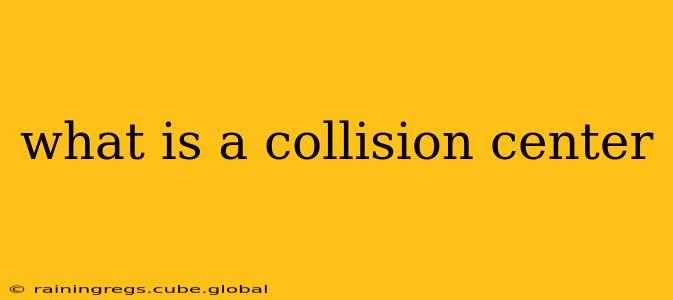A collision center, also known as an auto body repair shop or collision repair facility, is a specialized facility dedicated to repairing vehicles damaged in accidents. These centers handle everything from minor dents and scratches to extensive structural damage, restoring vehicles to their pre-accident condition. But what exactly goes on inside these facilities, and how do you choose the right one? This comprehensive guide will answer all your questions.
What Services Does a Collision Center Offer?
Collision centers offer a wide range of services, encompassing all aspects of vehicle repair after an accident. These typically include:
- Damage Assessment: A thorough inspection of the vehicle to determine the extent of the damage. This often involves using advanced technology like digital measuring systems to pinpoint hidden damage.
- Parts Ordering: Sourcing original equipment manufacturer (OEM) parts or high-quality aftermarket replacements, ensuring proper fit and function.
- Body Repair: This is the core service, encompassing tasks like straightening bent metal, replacing damaged panels, and repairing fiberglass components.
- Painting: Precise color matching and application of paint to restore the vehicle's original appearance. This often involves meticulous preparation, including sanding and priming.
- Mechanical Repair: Addressing any mechanical damage resulting from the collision, such as fixing damaged engines, transmissions, or suspension systems.
- Electrical System Repair: Restoring the vehicle's electrical components, including headlights, taillights, and electrical systems.
- Detailing: A final cleaning and detailing to ensure the vehicle is returned to its pre-accident condition.
How Does a Collision Center Differ from a Mechanic Shop?
While both collision centers and mechanic shops repair vehicles, their focuses differ significantly. Mechanic shops primarily handle routine maintenance, repairs, and mechanical issues. Collision centers, on the other hand, specialize in repairing collision damage, which often requires specialized tools, techniques, and expertise in structural repair and paint matching. They are equipped to handle the complexities of restoring a vehicle's structural integrity after a significant impact.
What are the Different Types of Collision Centers?
Collision centers can vary in size, scope, and the types of services they offer. Some common types include:
- Independent Shops: Smaller, locally owned businesses that often provide personalized service.
- Dealership Body Shops: Located within dealerships, these centers typically use OEM parts and may have specialized knowledge of specific vehicle makes and models.
- Large Multi-Shop Chains: National or regional chains that offer standardized services and processes.
What is the Repair Process at a Collision Center?
The repair process generally follows these steps:
- Initial Assessment: Inspection of the vehicle to determine the extent of the damage.
- Insurance Claim: If applicable, working with the insurance company to file a claim and get approval for repairs.
- Disassembly: Careful removal of damaged parts to access the underlying structure.
- Structural Repair: Straightening bent metal, replacing damaged parts, and restoring structural integrity.
- Bodywork: Preparing the surface for painting, including filling dents and smoothing surfaces.
- Painting: Applying primer, base coat, and clear coat to match the vehicle's original color.
- Reassembly: Putting the vehicle back together, including installing new or repaired parts.
- Final Inspection: Thorough quality control check to ensure all repairs meet standards.
- Delivery: Returning the repaired vehicle to the customer.
How Do I Choose a Reputable Collision Center?
Selecting the right collision center is crucial for ensuring quality repairs and a positive experience. Consider these factors:
- Certifications and Accreditations: Look for centers with certifications from organizations like I-CAR (Inter-Industry Conference on Auto Collision Repair) indicating their commitment to quality and training.
- Customer Reviews and Testimonials: Read online reviews and check for feedback on customer satisfaction, repair quality, and communication.
- Insurance Company Relationships: A strong relationship with insurance companies often suggests a reputable and efficient operation.
- Technology and Equipment: Modern equipment and technology are essential for accurate repairs.
- Warranty: A comprehensive warranty on repairs is a sign of confidence in their work.
Choosing a collision center is a significant decision. By understanding the services they provide, the repair process, and how to choose a reputable facility, you can ensure your vehicle is restored to its pre-accident condition with confidence. Remember to always ask questions and compare quotes before making your decision.
